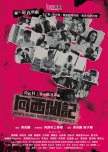
Bleak look at dating and love in Hong Kong
Everyone in Hong Kong West Side Stories was looking for love or to get an itch scratched and they didn’t care if they had to lie, cheat, or kill to make it happen. Six vignettes over 12 short episodes focused on different characters though there was some overlapping. These stories were from a decidedly male point of view filtered through the Black Mirror.The first 3 episodes featured two unlikeable men. Both received exactly what they deserved. Episode 4 was my favorite and even though it took a rather bleak, monetary look at dating, at least the couple was engaging. Episode 5 was about perception and sex in a public place. Warning--this drama has several scenes with people having sex or talking about it graphically. Episodes 6 and 7 caught me by surprise, falling under “be careful what you wish for.” Episode 8 focused on scams and a young man who was willing to work(out) for the possibility of love. 9 had a trippy twist to it. A virgin in episode 10 misconstrued messages and missent one as well. 11 and 12 gave new meaning to sibling rivalry with utterly vile behavior.
Women tended to be shown in a mercenary light or as bright as a 10-watt bulb. There were a couple of intelligent women but they were anomalies. There weren’t many episodes where a woman’s role extended beyond being in a man’s sexual crosshairs. The men couldn’t understand why they were alone or the good women didn’t want them. Um, cheating, lying, being obsessed with porn, strange or obsessive behavior or not being able to look a woman in her eyes because their gaze traveled further down. There was a “comedic” twist in one vignette that crossed the line where a woman’s consent is concerned. Despite being well made, too often instead of hoping for a happy ending for these characters I was completely revolted by them. Nearly everyone was screwing, being screwed over or screwing someone else over.
Many of the characters faced the problems of not making enough money to either pay rent or buy an apartment, much less a car. They often worked long hours with little reward. Lonely and desperate they sought out companionship in one form or another whether it was looking for love or looking to score. Friendships were as rare as healthy romantic relationships.
Hong Kong West Side Stories offered a few intriguing stories with disquieting twists. If you are in need of a feel good drama, this is not it. I found the majority of stories to be dark and depressing with people constantly self-sabotaging themselves. Though described as a dark comedy there wasn’t much to laugh about.
28 January 2024
Was this review helpful to you?
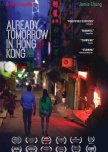
Worth the trip
Already Tomorrow in Hong Kong was a short, sweet romantic stroll through scenic Hong Kong. If Before Sunrise (1995) was made by the Hong Kong Board of Tourism this is what you might get.Ruby is a Chinese American visiting Hong Kong on business who needs help finding her friends one evening in the bustling city. Josh, an American ex-pat, overhears her problem and offers to show her the way. He’s in finance but wants to be a novelist and she designs popular talking toys but wants to own a boutique for designer clothes. The two click as they walk and talk, the only problem being he has a girlfriend. A year later, they unexpectedly meet again on a ferry. Once again, they spend an evening walking and talking. This time she’s attached to someone else as well.
Josh’s girlfriend doesn’t understand his American pop culture comments while Ruby’s sassy comments go right over her boyfriend’s head. Free spirit Ruby is in a highly structured relationship while Josh’s girlfriend is too afraid to tell her parents that she’s been dating a white guy for two years. The evening walks cause each to reevaluate their current relationships. Josh and Ruby are attracted to each other on physical and intellectual levels. This doesn’t mean they are perfectly made for each other. He loves Hong Kong, exploring and learning about his surroundings and the people while Ruby tolerates it and can’t wait to go home.
Bryan Greenberg was perfect as laidback Josh who enjoyed the beauty and entertainment of Hong Kong. Jamie Chung radiated energy as Ruby cut through the subterfuge with her lightning wit. I did not envy her walking around the city in her high heels though. Richard Ng made a brief appearance as a fortune teller whose bird did most of the work. The real star of the film was Hong Kong’s nightlife with colorful lights and streets filled with people. The couple traveled on foot, by bus, cab, ferry, and escalator. The two were drenched in the hues of golden lamplight and the technicolor of neon lights, spurred on by the verve of the city and their burgeoning feelings for each other.
"When are you ever 100% sure about anything?"
Unlike Before Sunrise, I enjoyed the casual conversations Josh and Ruby engaged in. Flirty and honest (ultimately), they sounded like two people getting to know each other and finding the familiar rhythm of a kindred soul. They weren’t callous adulterers, they were two people walking and talking who over the course of two evenings, set a year apart, began to understand that their conversations were leading to deeper feelings for each other. More importantly, their time together shed light on serious issues in their current relationships. What did they want to do?
For people unfamiliar with Hong Kong, like myself, the strength of this movie was the gorgeous tour of the city. Josh and Ruby may have decided to be together tomorrow in Hong Kong or for her to return to yesterday in Los Angeles. Either way we’ll have the memory of two beautiful nights in a fascinating place.
19 January 2024
Was this review helpful to you?
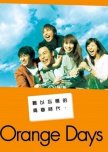
"The evening sun shined on us like a freshly picked orange in the sky"
Orange Days brought out the sweet and sour times for five students in their final year at university. This coming-of-age drama explored friendships, hardships, romance, and finding their place in the world. I watched Orange Days during its 20th anniversary year and its stories of life and love still hold up even if the technology and styles were dated.Kai, Shohei, and Keita are friends at university. Kai and Shohei are still trying to figure out what they want to do when they graduate while Keita knows his future is in his family’s wedding business. One day Kai comes across a young woman, Sae, playing the violin and his world is turned upside down. Sae and her friend Akane are slowly integrated into the group, eventually called the Orange Group which has its own spiral notebook in the lounge for the members to write down their thoughts for each other.
I was pleasantly surprised that the male lead, Kai, was a nice guy. Too often in older dramas, the MLs were cold alphas. Sae was the cold and volatile character in this story. A musical prodigy and on her way to fame and fortune she lost her hearing which caused her to close her heart off. Shohei was the player of the group, but Akane quickly sussed out that he had a heart of gold under his sarcastic exterior. Poor Keita ended up being the fifth wheel, unlucky in love but still supporting the others.
True to life at university, the characters were struggling to figure out who they were and where they were going. Having a degree and knowing exactly what to do with it are often two different things. And much like in real life, the lovers often made mistakes, sometimes stupid ones as they discovered what made each other tick and what ticked each other off. The group began to learn sign language so that Sae would not feel left out. If there was anything that didn’t feel realistic it was that a lot of people became fluent in sign language quickly when it would be like learning a foreign spoken language. Sae's desire to cling to her gift of music provided for numerous violin and piano solos along with the classical background music which I greatly enjoyed. The drama didn’t shy away from showing how her disability affected her skill sets.
Tsumabuki Satoshi gave a gentle performance as Kai with the porcupine hair who wanted to be a handrail for people to help them up and be their best selves. Shibasaki Ko had the more difficult role of Sae, conveying all of her complex emotions without saying a word. I tried to not give up on Sae. She could occasionally come across as a temperamental toddler, her volatile moods swaying back and forth. Her character growth was slow and as often happens she took a dramatic step backward in the last episode which was nearly the breaking point for me. For the most part, Kai would call her on her selfish actions and cruel words.
Orange Days highlighted the time in life when the bonds of friendship were vibrant and love could be elusive, rapturous, and excruciating. The group attempted to squeeze all of the joy and meaning they could out of their days, knowing that they were on the cusp of adulthood. If I could change anything it would have been Sae’s impulsive and self-protective decisions in the last episodes. But as in real life, change is hard and takes time and most people will slide back into old behaviors before making lasting transformations. Watching these young people face their unknown futures with hope and enthusiasm was addictive and comforting, well worth trying out.
9 January 2024
Was this review helpful to you?
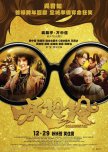
This review may contain spoilers
"The deliveryman has become takeout!"
Sandra Ng directed and starred in the silly ghost story Goldbuster. It’s rare for a woman to have the chance to direct and Sandra acquitted herself nicely with this film about an eclectic group of tenants being forced out of their homes so that the apartments could be demolished by an immoral land developer.The rundown Prestige Garden Apartments are down to its last seven tenants-two fugitive gangsters, a widower and his son, two bankrupt inventors, and an erotic web cam girl. When they grow tired of being haunted by a ghost, they call in a ghostbuster. With the arrival of bargain basement Ling, the ghostly comedic antics begin in earnest.
The tenants were a mixed bag of odd characters. One of the gangsters, Ming, played by Francis Ng, believed he was a cop and often postured himself like Crockett from Miami Vice. The other gangster, Ren, had a girlfriend who required a bike pump to stay inflated. Wang Bao Jian, an acupuncturist, suffered from the guilt of being unable to save his wife. His son hadn’t spoken since his mother died. Wang didn’t want to leave the building hoping her spirit would come to visit. Ping, the erotic webcam girl, enjoyed living in the nearly empty complex. The ghostly visitations had the added benefit of increasing the visitors to her site. No one in the building knew if the inventors Jin San and Ju Hua were working on their next invention or were in actuality drug dealers. Two of Boss Xu’s men were under orders to dress like ghosts and scare the tenants out of the building. When the brassy swindler Ling walked in she made more objects disappear into her pockets than exorcising ghosts.
Things I learned: 1-People who cheat small money are swindlers, and those who make it big are businessmen. 2. You can go to hell for photoshopping. 3. There’s always room for one more needle in acupuncture.
Sandra Ng created an elaborate swindle comedy involving ghosts, zombies and a hellish underworld. She even threw in a Thriller re-enactment. The comedy in this was over-the-top at times but never devolved into the overt mugging cross-eyed at the camera some comedies relied on. I’m not a huge fan of Hong Kong comedies but I laughed out loud in several places. The glue that held this story together were the tenants and the family they had created from a diverse group of good-hearted weirdos. Goldbuster could be obvious and erratic and lacking in subtlety, but it could also be warm and funny at the same time. Sandra Ng could be proud of her directorial debut, it may not have been eek-tastic but I really hope it wasn’t a dead end for her directorial career.
10/17/23
Was this review helpful to you?

This review may contain spoilers
"Life itself, shines down on its own"
Ghost Walk told the story of an unremarkable woman who became entangled in rather remarkable supernatural and natural events. The film was more of an exploration of Hye Jung’s existential dilemma than horror. Though there were high stakes for several characters involved, the movie played out like a gentle slice of life.The story began on October 8th, Korean Thanksgiving. Hye Jung works at a textile factory and has cut all ties with her family hoping to make it on her own and be free of them. After work, a co-worker walks her home, gives her a birthday gift and declares himself. She tells him she's incapable of having a relationship and turns him down. In fact, she has no close relationships with anyone, including her roommates. Three days later she wakes up to find to find those roommates being questioned by the police and a large blood stain soaked into her bedroom carpet. From there her un-life will become entwined with a little girl, a loan shark, and her roommates. Each day she wakes up one day earlier than the previous day as she discovers how they are all linked.
Ghost Walk may have had a murder mystery to solve, but it seemed to focus more on the isolating nature of financial and familial social pressures. Hye Jung preferred being alone and suddenly she was well and truly alone. To her credit, the reserved young woman handled the supernatural events in her life with aplomb and without breaking down. The effects of gentrification also played a small role. Hye Jung’s connection to the world was Soo Yang, the daughter of the loan shark, with their destinies depending on one another. The music, like Han Hae In’s acting, was never overwhelming, never loud, only softly and mildly accenting the action in select places.
There were times the film attempted to be too clever and enigmatic, especially the film’s ending quotes. It's unhurried pace will not be for everyone. Ghost Walk didn’t break any new ground, this type of story has been told before but it was a quiet ghost story that helped an unremarkable woman gradually break out of her shell. Whether her actions would aid her or anyone else remained to be seen.
10/9/23
Was this review helpful to you?
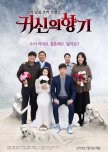
In this fantasy drama, the most unbelievable thing for me was not the sex crazed and pervy ghosts lurking about, it was that the lovely Lee El and Kang Kyung Joon, 37 and 36 years-old respectively (in 2019) were supposed to be playing university students. I might have bought it if they were working on their second PhD or if they’d been professors, but as youthful as they appeared they didn’t look like college kids.
Despite the distracting age issue, the actual love story was sweet, funny, and bittersweet. Unfortunately, it didn’t take up enough time so more time was given to middle-aged people banging all day or the cops trying and failing to play ghostbusters. Son Byung Ho who usually plays wealthy CEOs, played a shaman with a good heart in a nice change of pace. The comedy was hit or miss and the sex romps began to wear thin. I really wish they’d devoted more time to the budding romance, it would have strengthened the story greatly. If you’re looking for a ghost story with humor (some funny, some not) and pathos, with a short running time, this might be a film to check out if you keep your expectations low, real low.
10/9/23
Was this review helpful to you?

This review may contain spoilers
Who knew Yetis love sashimi?
If you ever thought, “What would a movie be like if you moved King Kong from a tropical island to a frozen mountain top?”, Snow Monster attempts to answer that question. The movie felt like an old Toho monster movie only with slightly better CGI and monster costumes.In 2045 a van carrying scientists travels through the mountains on the North Pole. I really hope that was a translation error or else there had been some cataclysmic tectonic shifts. Lead scientist Xiao Qin’s instruments showed high magnetic readings and a geothermal hot spot under the van. The scientists believed that high magnetism could result in strange genetic mutations. As if to prove them right, a gigantic hand erupted from the snow causing the van to plummet over a cliff.
Professor Lin asks Xiao’s ex-boyfriend, Ren Yi Fei, to help them find her and he joins the team made up of mostly soldiers. Inside an ancient set of ruins in what looks like a jungle, the team discovers a tunnel filled with centuries old artifacts, skeletons…and deadly prehistoric birds. The men avoid becoming human bird food when they find the exit while being chased by the creepy birds and land outside, in the same location where the lost crew disappeared. The “rescue” crew is confronted with a snow shark (Jaws 5: Just When You Thought It Was Safe to Go Back Skiing), the Yeti, an avalanche, and a tribe of snow elves. Lucky for Ren, the snow elves are friends with the gentle, humorous Yeti. The real danger is a friend who isn’t what he seems to be and his betrayals lead to multiple deaths.
Snow Monster's script was all over the place and most of it did not make sense. I guess they figured if people would watch a movie about a skyscraper tall snow monster, it didn’t matter if the rest was nigh on incomprehensible. There seemed to be a message about leaving endangered people and animals alone, but it was pretty thin. The snow elves’ costumes revealed too much skin for people who lived in eternal winter. Maybe the magnetic field had mutated them in such a way that they were impervious to frostbite and hypothermia. The “science” in this movie was ludicrous and I have no idea what kind of geographical map the writers used, but it wasn’t for this planet. The acting and CGI were serviceable, nothing special. Norman Chui was the only actor I recognized and I’m always happy to see him even for the brief minutes he was on screen.
In order to enjoy this movie on any level you have to have developed a high tolerance for men in monster suits and be able to laugh at the absurdity of giant snow sharks. As is often the case, the humans were the biggest monsters in the movie. The Snow Monster was a sweet fluffy Bumble, as long as you didn’t interrupt him while he was eating his sashimi dinner.
10/7/23
Was this review helpful to you?

This review may contain spoilers
A picture is worth a thousand words, or is it?
If you are not old enough to remember rolls of film, one of the commonly used rolls had 36 shots on it. This film was told in 36 segments based largely on camera shots or the memories from those shots as if labeling a picture or a memory. The film leisurely and gently explored the relevancy between photos and memories and the malleability and impermanence of both.Sai is a film location scout and Oom is the art director. They meet scouting out an abandoned love hotel from the Vietnam War era that Sai has memories of being in her old neighborhood. Sai uses a digital camera, taking many pictures that she will later store and keep. Oom still uses a film camera and often takes pictures of people when they aren't looking even though he refuses to have his picture taken. Though he says he will send them a copy, he rarely does. The two spend a lot of time discovering the nooks and crannies of the possible set and also negotiate with the landlady over room prices for the cast and crew. Oom takes a picture of Gita, the landlady's 12-year-old daughter that later may prove important. Afterwards, Sai and Oom enjoy an evening breeze from the roof and take their picture with her camera in front of the beautiful sky. Soon the "end credits" appear after the 11th shot.
The film jumps into the future 2 years. Sai and Oom have gone their separate ways. When the director she is currently working for discovers the building he built his new script around has been leveled, Sai mentions the other building. She attempts to recover the photos but even after a friend works to restore them, only a few survived and not the one of her and Oom on the rooftop. She returns to the building and talks to the landlady. It turns out Gita died and the landlady would love to have the picture Oom took of her. During the process of trying to find Oom and restore the pictures, she realizes her feelings for him were stronger than she had known. As the film closes in on the 36th segment, Oom looks at the picture of them on the roof faraway on his computer (unknown to her he had copied her images from the shoot long ago), Sai smiles as she remembers the special moment they shared.
36 was shot in an artful way that could also distance the viewer from the characters. Oom is never seen face on, and often shots of other characters were in profile or from behind or even half hidden by architecture. I liked the labeled 36 bits of the story, like looking at a picture album where the photo had been annotated and saved. The OST was also lovely, I especially enjoyed the piano music.
Just as film cameras have mostly transitioned over to digital cameras so are most movies now shot with digital film. The danger of digital film was also addressed in that backups are necessary, because once a disk or other device has been damaged the pictures are likely lost for good. Her friend Kai mentioned how many people brought hard drives to be fixed saying they needed them immediately, but instead never returned for them. A drawerful of memories lay untouched. For one reluctant woman who came to pick hers up, he offered to erase those memories.
Which is more important? To see a bird or to take a picture of it? To experience the person you are with, or only the relative engagement of photos? The argument is made for both the value of the human experience and memory as well as the memories that are brought back by glancing at a photo. For the director whose childhood building was destroyed a picture is all that is left of it and his memories. Ironically, at the end of the movie, Oom who always valued the human experience more is found looking at Sai's picture and reminiscing. Conversely, Sai goes back to the place they shared and the memory floods her mind as she gazes fondly to where they had been together. Memory is a fragile, fading construct of the mind, subject to change. While memories are important, photos help to shore up the time and events. Buildings crumble, people die, digital photos can be erased, photos fade and relationships shatter, 36 touched on the concept of impermanence as well. There comes a time when no one remembers the people or places in the pictures.
While I enjoyed this film, it also failed to emotionally capture me with the relationships involved. The ending was meaningful to the arguments of photo or memory, but it left a hole in the picture I had hoped to find. I was hoping for a 37th epilogue image or a new roll of film to begin. This is a very slow, artful movie, more philosophical than touching. Yet for its shortcomings I did find it engaging. If this genre is of interest to you, it would be well worth trying.
5/23/23
Was this review helpful to you?
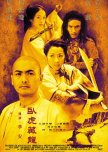
"A faithful heart makes wishes come true"
I first watched this film when it was theatrically released in my country years ago. All I had to go on was a friend's recommendation and zero background in the wuxia genre. To say I walked into the nearly empty theater apprehensive would be an understatement. My fears were for naught. In a matter of minutes, I was completely mesmerized by the cinematography, music, and acting. Having watched my share of fantasy and super hero movies, I had no problem with the flying and light body technique as the characters danced across rooftops or fought high in a bamboo forest. The graceful movements and fighting techniques were like nothing I had ever seen. Crouching Tiger, Hidden Dragon was the gateway into a new world for me. Little did I know that it would set the bar for all films that followed.Though this movie was a wuxia, the heart of the film were the two romances. Yu Shu Lien, the owner of a delivery escort service and Li Mu Bai, a warrior trained at Wudan had fought their feelings for years. Their love was unrequited as Lien had been engaged to Li Mu Bai's friend, but he was killed and the two would not act on their feelings. Now they are reunited as Mu Bai brings her his famous sword, The Green Destiny, and asks her to deliver it to their protector. His journey toward self-enlightenment has brought him to her and he wishes to leave the bloodshed behind them. The 400- year-old sword is too much temptation for Jen, a young woman engaged to be married but secretly trained by the devious Jade Fox. The incognito Jade Fox had poisoned Mu Bai's master years before for his refusal to teach her the secrets of Wudan. Lien is aware who stole the sword and works to return it without bringing any dishonor to the families involved. The middle of the film focuses on Jen and her previous love affair with Lo Xiao Hu/Dark Cloud, a charismatic desert bandit, and in the present when she takes the sword a second time to find her way as a wandering warrior. Mu Bai and Lien know she needs someone righteous to train her before she becomes a poisonous dragon. The treacherous Jade Fox has only vengeance on her mind for Jen and Mu Bai. By the end of the film the characters will collide in a deadly conclusion.
On a recent re-watch, I could see all of the classic wuxia elements from the over 200 martial arts movies I have watched since that long ago day in the theater. Ang Lee used those elements but blew them up into a grand epic, showcasing a wide variety of stunning scenery taking the genre where it had not been before. Characters traveled through the mountains, desert, verdant valleys, and lush bamboo forests. The inn and outdoor café sets ubiquitous in so many old kung fu films made their appearance in grand style this time. The busy city streets didn't feel like a small set, but substantial with plenty of extras to add an additional layer of realism. Ang Lee made full use of the sets and scenery to bring about an energetic and beautiful atmosphere for the story to be told in. Unlike so many martial arts movies prior to CTHD the characters in this film were more important than the fighting. He not only succeeded in making a gorgeous framework for the story but also in developing characters we could feel empathy with as they struggled with their deepest feelings. They had depth and emotional weight to them instead of the thinly drawn characters of old. By paying attention to the smallest details and insisting on a quality presentation, Ang Lee set the bar higher for those who would follow him.
Michelle Yeoh was a revelation to me, and I will always be thankful for this film introducing me to her. She had been in the business for over 15 years at this point honing her craft and risking life and limb at times to do so. Though her fighting technique was fearless, quick, and agile, it was her expressive face revealing longing, fierceness, and tenderness that quickly drew me in and made me a life-long fan. Her portrayal of the mature and wise Yu Shu Lien was perfect. Chow Yun Fat as the spiritual warrior Li Mu Bai, showed how he was torn between his love for Lien, his desire for enlightenment, and his need to avenge his teacher. His calm demeanor was in stark contrast to Jen's firebrand personality always teetering on being out of control. Zhang Zi Yi in only her second film held her own with the veteran actors. As Jen she conveyed naivete, passion, and anger fluidly. Chang Chen as the ardent Dark Cloud resonated the wildness of the desert and his fervent love for Jen. Again, there was the contrast of Jen and Lo's fiery passion in comparison to Mu Bai and Lien's controlled, repressed love. Rounding out the stellar cast was Cheng Pei Pei as Jade Fox. I have gone on to watch her earlier movies where she had been the young female warrior who faced insurmountable odds, paving the way for other actresses. I'm so pleased they used her in this movie as the vengeful villain and gave the kung fu veteran a chance to shine.
Lien and Jen both sought freedom in their own way and both were bound by duty. Jen loathed being forced to marry wishing only to be free and Lien greatly desired to be with Mu Bai, but was prevented by a rigid sense of honor. The two couples were the inverse of each other emotionally and would gradually become more like the other whether a crouching tiger, biding its time or a hidden dragon of emotions. Lo and Jen, embodied the recklessness of youth with no regard for tomorrow. Lien and Mu Bai sought to guide them to more thoughtful actions. For restrained Lien and Mu Bai, they had reached the point where they were finally able to break through their control to unleash their feelings and unspoken words. True love trumped spiritual enlightenment as what was important became revealed in one last breath.
The only quibble I have with this magnificent film is with the long flashback interlude showing Jen and Lo's love affair. It was similar to The Taming of the Shrew and feels dated in the telling.
Yuen Woo Ping masterfully matched the fight choreography to the mood of the film. The actors did much of the fighting, check out all the face time during the battles. Instead of CGI, the floating and leaping, even in the bamboo forest-truly a thing of beauty, was accomplished by wire work. The fights were more elegant than brutal and more visually captivating than realistic. Aside from the bamboo forest fight, the fight between Lien and Jen was spellbinding. The experienced Lien used a variety of weapons as she sought to subdue the thief of the Green Destiny in a memorable fight choreography.
After my recent re-watch I found that Crouching Tiger, Hidden Dragon has stood the test of time. Though I have searched for its equal or better through the years I have yet to find a martial arts film to top this one. Only Hero's stunning aesthetic came close. Compelling characters, wonderfully acted, enchanting cinematography, a haunting score, and balletic fight scenes have made this the measuring stick for all other films. It is rare for a film to touch me deeply emotionally and this one has for over two decades. I need to remember to thank my friend again for encouraging me to visit this world of wonder.
3/31/23
Was this review helpful to you?
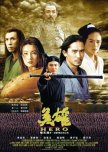
This review may contain spoilers
All is fair in love and war...
For those who love wuxia or Zhang Yi Mou's films, Hero will weave around you, wrapping you in its hypnotic effects of color, music, scenery, and skilled performances. The film is a poetic examination of the different facets of being a hero and the sacrifices required. As a fan of both wuxia and Zhang Yi Mou I found this film breathtakingly beautiful and emotionally heartbreaking.It is helpful to understand on the first watch of Hero that the story is not told in chronological order or from a single viewpoint. Each viewpoint and version of the story has a particular color hue. When the warrior Nameless is brought before the Qin emperor, gray and black dominate the color scheme. Nameless has killed the three most infamous and dangerous assassins in the realm granting him unprecedented access to the emperor, coming within 10 paces of him with only several rows of candles between them. The emperor asks Nameless to explain how he came to possess the weapons when even 3000 soldiers could not acquire them.
Nameless (Jet Li) tells the emperor a story of how he defeated Sky (Donnie Yen) and his silver spear in the rain accompanied by an old blind man playing the guqin. Every time I watch this movie it is a treat to see Jet Li and Donnie Yen fighting in the rain with water dripping from the rooftops. Next, in a world gone crimson, Nameless explains how he defeated the warriors and lovers Snow (Maggie Cheung) and Broken Sword (Tony Leung). Broken Sword believes that calligraphy and sword fighting are intertwined. He and Snow are the masters in a calligraphy school drenched in red but have a rift driven between them. This vermillion school is the home of primal emotions-jealousy, hate, lust, and revenge. Nameless wants a banner with the unique and 20th version of the word "sword". This memory has a sequence with an extraordinary fight between Snow and Moon (Zhang Zi Yi). In a spiraling storm of golden leaves the two women swirl and parry until blood is drawn and the leaves echo the color of life and death.
The emperor doesn't believe Nameless and gives his version of events now told in blue. The characters are calm, clear thinking and accepting instead of being ruled by their passions. Instead of Nameless ending up with the swords because of vengeance, this time the lovers willingly hand over their swords in order for the skilled Nameless to kill the emperor. After Snow sacrifices herself Nameless and Broken Sword have a balletic battle over a tranquil cerulean lake.
Finally, the truth is told in white as death hovers ever near for the characters and the genuineness of their motives is revealed. The emperor's memories of Snow and Broken Sword attacking him three years ago are in green with floating green curtains hanging from the throne room ceiling. In this emerald world Broken Sword had a moment of clarity and that clarity distanced Snow from him.
Zhang Yi Mou's lush and color saturated frames were romantic and stunningly spectacular. Every version of the events was filtered through the chosen color-lighting, wardrobe, and sets. He is a director who always knows how to get the most out of nature's scenery whether in the wind blown desert or a verdant hillside. Tan Dun's score was splendidly lovely and mournful.
This film had a dream cast. Jet Li's reserved acting was perfect for the Nameless and committed warrior. Maggie Cheung and Tony Leung have never looked more beautiful. Snow and Broken Sword had a tender yearning for each other tragically tethered to her burning desire for revenge. They were truly the emotional heart of the film. Neither the lovers nor their swords could ever be parted. Their final scene was emotionally shattering. Zhang Zi Yi played Broken Sword's servant, Moon. Thinly drawn, she filled it out as much as she could. Donnie Yen was only briefly featured and brought the martial arts credibility to go along with Li's. Chen Dao Ming gave the right amount of balance, maybe more humanity than he deserved to the tyrant emperor.
Despite being a wuxia, the fights were not the main thrust of the story, even though they were well choreographed and shot. For those not familiar with the genre, the fights often relied on wire work. Though most of the actors were quite graceful as they danced and twirled in the air, there were a few gaps. The choreography tended to err on the side of the visual instead of the realistic which made for imaginative sword work. Jet Li moving through the rain drops is still one of my favorite movie images. The large Qin army raining down impossibly numerous arrows on the calligraphy school with two characters countering them conveyed the dire situation of the heroes and the high stakes.
The only thing that kept this film from being perfect for me was the ending. The emperor's adage that the brutal destruction of his enemies and annexation of their lands was for the greater good and the hero's acceptance of this was disturbing. I thought it was ironic that the old calligraphy master said, "Qin arrows can never annihilate our written words." In reality, the emperor did just that by massive book burnings and burying alive over 400 scholars who disagreed with him. I do agree with Broken Sword that the goal is to be rid of the desire to kill and the need for the sword and to live in peace with one another. Because this is not my country and history, I do not have an educated view on this emperor, only a limited personal opinion. Whether desiring to kill the emperor to prevent further war or letting him live to prevent further war, the heroes were willing to sacrifice all for their beliefs.
Despite the ending, I loved this film. The haunting score, the lush colors, fanciful fights, and sorrowful love story pull me in every time. In large part due to the stellar cast and Zhang Yi Mou's exquisite directing style, I have found few wuxias better than this one.
3/27/23
Was this review helpful to you?

This review may contain spoilers
We are the stories we tell
Taipei Exchanges is a gently introspective slice of life about two sisters who ponder what stories hold value when they set up a barter system in their coffee shop. This film is not for everyone. The changes in the sisters and their customers are small and quiet and will go unnoticed if you don't pay attention from your table in the corner of their café. If coffee and discovering the meaning behind the stories people tell about their lives and belongings interest you, pull up a chair, order a coffee and cookie and see where the film and memory takes you.If someone gave you the money to do one, which would it be? Use the money to study or travel?
Doris is practical and has always wanted to open an elegant coffee café. When she finally has the opportunity fate turns her dream into the quirkiest shop in Taipei. Without giving too much away, on her opening day she ends up with a plethora of calla lilies and invites people to bring something to exchange for them. Afterwards with their shop full of junk, her sister has the idea that customers can bring something to exchange for whatever is in the shop thinking it will create more foot traffic and people will stay longer and drink and eat more. Doris reluctantly agrees hoping it will lead to financial freedom for her. Josie wants a car for herself and a set of bone china for her mother.
Along the way, the sisters find that what things are worth is a deeply personal belief. What is the story behind it? Love letters, songs, a mirror ball, stuffed alligator, and even cleaning out the backyard drain are up for exchange. As Doris hears the stories of the places people have traveled, a shift begins to take place in her.
What do you treasure the most?
Doris makes a decision that seems radical and perhaps it's radical self-love to realize that what we value may change over time. The sisters believe that whatever you are looking for someone has and it's only a matter of time before the need to have and the need to release meet each other. Often our lives can be changed by one small incident and decision, in Doris' case a fender bender with a small truck full of calla lilies led to small change after small change leading to a larger change in her life and the lives of those around her.
Taipei Exchanges is beautifully and thoughtfully shot, within the store and around Taipei. The OST is soothing and won't jar you out of the existential questions that arise over what we value, why, and what is our inner value to ourselves and others. For the most part the acting is natural and the sisters have good chemistry in the way that sisters love each other still bicker. Some of the basic business issues are touched upon when starting up a business, but don't weigh the story down. People off the street answer two of the questions above and though some may sound more scripted, others are quite relatable.
Everyday we tell ourselves stories about our failures, hopes, dreams, and even the lies about ourselves that help us sleep at night. We cherish the stories behind an object or even despise an object because of the emotional baggage that it carries. Is a song worth a book? A Barbie dollhouse worth a mirror ball? What happens when people exchange goals and dreams? This film will not turn your world upside down, but it may cause you to take a moment to look around and even within yourself and wonder what has value and why?
If you had the choice between money and calla lilies, which would you take?
2/24/23
Was this review helpful to you?
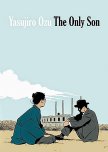
This review may contain spoilers
"Tragedy in life starts with the bondage of parent and child"
The Only Son is considered director Ozu's first talkie. Even with the spoken dialogue he still leaves space and silence to contemplate his characters' actions and conflicts. Classically Ozu, he studies the relationship between a parent and grown child. Instead of the wealthier families of some of his later films, this widow and child are living in poverty. In this film he also has the son and mother begin to define what success means to them and the emotional cost of failure.The story begins in 1923 in rural Japan. The mother works at a silk factory doing rigorous physical labor. Her son wants to continue his education, an education she can't afford. His teacher who is preparing to leave for Tokyo stops by the house congratulating the surprised mother on allowing him to go to high school as the son had told him she'd agreed to it. Ultimately, she decides to make whatever sacrifices she must for him to have a better chance in life. The last thing he tells her is that he will become a great man.
The story jumps ahead to 1935 with the mother missing her son and deciding to go visit him in Tokyo. Mother and son have not seen each other in years and seem happy to be together again. The son has a surprise for his mother, he is married and has an infant son. He also is working as a night school geometry teacher and living in a small house in view of the garbage incinerator smokestacks. This brings about the critical theme of the film. The son is ashamed of his job and lifestyle after the sacrifices his mother made for him. The mother is disappointed that he seems to have given up on attaining a better life. Much like in Tokyo Chorus, 1930's Tokyo is portrayed as the great dream destroyer.
Later in the film, the son helps a neighbor in such a way, that the mother beams at him with pride. He may not have become the great man she'd hoped for, but he had become a good man with a good wife. For her, this is enough to ease her worries about him. This is success in her eyes.
Ozu uses many of the techniques and compositions that will define his later work. Filming from the mat, even when in a car is in place. His ubiquitous teapot takes center stage in many scenes. As always, every prop, every angle is thoughtfully and creatively brought together to be aesthetically pleasing and to help tell the story. At one point after an emotional confrontation between mother and son, with his wife sobbing in the background, Ozu lingers on a shot of a painting on a wall near a window and holds that shot for almost a minute, as night turns to day. Almost as if the raw emotions of his characters needed time to be processed by them and us.
Tokyo was the great soul crusher, and during this time the depression had finally caught up with Japan, making work hard to come by. The son's teacher had to become a cook in a small restaurant. The teacher was played by Ozu regular Ryu Chishu, someone you could always count on to bring a character quietly to life. Lida Choko conveyed the mother longing to see her son, happy to be in his presence, and also discouraged at his negative resolution perfectly. Himori Shinichi felt like the weaker acting link. He spent much of his time smiling and gave no inkling of his character's desperate emotions for most of the film.
Interestingly Ozu had the mother and son go to the movies and watch a popular German talkie. Rather lengthy clips of the film were shown. The son's house also had some posters from German movies. Though imminently Japanese, the great director was also open to influence from foreign films.
The German film was one of the only outings we see that the son took his mother on as he spent most of their money trying to show her Tokyo. Unlike so many of the ungrateful male characters in older movies, ones women sacrificed everything for, this son, despite the financial hardship, wants his mother to have a special time. He wants to make her sacrifice worthwhile and up until then had felt he'd completely failed. Even with hardships, disappointments, and setbacks, the film had a warmth and gentle humanity to it. Life wasn't easy, but the film showed the value of family and friendship, of looking out for each other.
As so often happens in Ozu's films, the parent ends up alone. The mother may have been alone, but after seeing the man her son had become could find acceptance in her trials and life. The son, reinvigorated from his mother's belief in him, sat aside his nihilistic acceptance to once again hope. This quiet film was realistic and engaging on many levels. Easily one of my favorite Ozu films.
10/24/22
Was this review helpful to you?
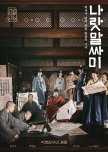
This review may contain spoilers
The world is not ruined by the truth
The King's Letters gave a fascinating glimpse into the creation of Hangul, the Korean alphabet. It was set in 1442 with King Sejong the Great determined to do something for his legacy as the sands were quickly running through the hourglass of his life and reign.The Joseon court was largely ruled by ministers and scholars schooled in Confucianism and Chinese writing. They were not at all interested in developing easily learned phonetic letters for their language. Sejong wanted all of his people to learn to read and write which would have meant more competition and a threat to their power and positions.
King Sejong was not to be deterred. An envoy of Japanese monks arrived demanding the Tripitaka, the oldest collection of Buddhist scriptures written in Hanja on over 80,000 wooden blocks. A series of dots connected him, with some help from the Queen, to the Joseon Buddhist monk in charge of the Tripitaka. Sejong discovered the monks could chant, read and write in Sanskrit which was based on phonetic letters. His Eureka moment occurred after years of failed attempts to create an easy and useable alphabet. Promising the monks he would build a temple in the capitol if they would help him with the alphabet, an uneasy alliance was formed.
Much of the film covered the monks and king working through their language and breaking it down into a total of 28 consonants and vowels. Instead of memorizing thousands of characters, what they were developing would make it much easier to be literate. Sejong wanted the letters to be elegant and concise like geometry using only lines, dots, and “facets”. The major conflict of the story was keeping what they were doing from the Confucian court. Due to conflicts with the Buddhists during the Goryeo Dynasty, there were hard feelings on both sides. Most of the tension, however, dealt with the ailing king fearing he wouldn’t live long enough to not only create the letters but also to spread their use so that they would be protected and take root.
Spoiler alert! Of course, they succeeded as we all know. Sejong did end up giving the Confucians credit to try and gain their support. It took time for the “vulgar” or “women’s” script to be accepted. Thankfully, women and fiction writers used it as well as Buddhist monks which kept it alive until it took hold. In 1849, it was adopted as Korea’s national writing system. Even the Japanese during their occupation who outlawed it, couldn’t kill it.
The King’s Letters did tend to slow down and become repetitive in the latter part. I am enough of a documentary geek that this felt like an enjoyable one only dressed up and with excellent acting. Song Kang Ho (King Sejong) had great chemistry with both Park Hae Il (Monk Shin Mi) and the late Jeon Mi Seon (Queen So Hun). The cinematography, sets, and costumes were all lovely.
King Sejong was playing the long game, he wanted an educated people who would only make the country stronger and more enduring. His vision didn’t come to bear overnight or even in his lifetime, but he planted a seed that did take hold, blossomed, and bore fruit. Is still bearing fruit. A legacy of knowledge which can break down class lines and open communication is not such a bad legacy after all.
10/10/22
Was this review helpful to you?
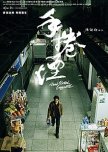
This review may contain spoilers
Let's Start Over!
Hand Rolled Cigarette is an old school violent crime drama that almost makes itself into something a little more special, but just misses the mark. Even in the face of debt and despair, two criminal misfits keep marching forward, hoping for that chance to start over. Along the way, the disparate strangers find themselves counting on each other to survive.The film begins with the turnover of Hong Kong and the servicemen previously in the Queen's army now being left behind. Chiu bolsters his military brothers by saying it's their chance to start over. Years later, some have made it better than others. Chiu and another military brother had borrowed heavily and invested in the stock market only to watch it crash and lose everything. Deeply in debt, Chiu hustles on the triad fringe to try and stay afloat, now shunned by his military brethren. His next big deal is as a middle man for a guy selling illegal turtles and a local kingpin, a deal that goes south landing Chiu in trouble.
Mani is an Eastern Asian immigrant, reluctantly in the drug business with his brother/cousin Kapil. Mani also takes care of his younger brother who is still in school. Due to racism, the family runs into financial and social walls everywhere. Kapil wants to take greater risks to make bigger scores which leads to deadly events after he makes a major mistake. They find out that drug dealers keep track of their product and are neither kind nor forgiving, especially with those who steal from them.
Desperately fleeing a vicious gang, Mani ducks into Chiu's apartment and hides. Chiu isn't thrilled when he finds the interloper but against his better judgement allows the young man to continue to hide there as long as he doesn't touch anything. They don't have many interactions but Chiu does help when Mani's younger brother gets into a fight at school.
Eventually, they decide to sell the stolen drugs to try and pay off everyone they owe. All of which leads to a violent no holds barred final confrontation.
Hand Rolled Cigarette is more of a character study at times than crime drama. Chiu keeps a video of his military days when he respected himself and what he did. He suffers enormous guilt over his past actions leading him to act self-destructively at times. Mani wants a better life for his younger brother, including a good education, even if it means sacrificing his own. The two small time criminals both are good men at heart forced into grim decisions by their crumbling circumstances. Recognizing that in each other they do make a bond.
Be advised there are scenes of torture and brutal murders. Mani is repeatedly called by a racist name. They don't shy away from expressing the racism underlying the society. It can be a difficult film to watch.
The cinematography while showing greater Hong Kong at night, also shows the suffocating world the men live in and all the deadly and dangerous things that can happen in small places.
This film is dark as the two men try to navigate the dangerous world of the triads, forming an unlikely bond. My only real caveat is that their friendship felt underdeveloped to me. I would have preferred a little more buildup of their relationship, events that might have shown the evolution of their devotion more. Or maybe they were just two guys that were hunkered down in the same foxhole with only each other to rely on as the bullets and bombs whizzed by. Either way it was an entertaining Hong Kong crime film, but with a little more relationship development I would have rated it higher.
9/15/22
Was this review helpful to you?

This review may contain spoilers
"Men will remain clueless unless we're more open about these things"
Our Rainy Days tackles a topic not only men are uncomfortable with, but many women as well---Menstruation. That monthly visitor most of the 51% of the population will deal with in some form or fashion in their lives is all part of being human for the female part of the species. Too often not medically studied or properly funded, because it's a "female problem", women have often suffered in silence. Period shame and period shaming will only end when people realize it is normal and healthy. This special takes a look at a photographer and a model both having to handle their symptoms on the job and in public.Kojima Hikari is a photographer on her fist big shoot and it's for a men's magazine. Aoi is a small time idol who wants to transition to acting and is following the path of a bikini shoot to get noticed. Hikari awoke to her alarm warning her it was PMS time, also that it was her first big shoot and to not screw it up. The day starts out raining as they travel by bus to the beach. Aoi's visitor pops in during the shoot causing problems that the men have no idea how to deal with.
This special discussed how not every woman can wear a tampon, much to the crew's chagrin. It also showed that despite their pain and other symptoms the two women were able to come up with creative solutions and do their work. As Hikari says, "Some crisis are opportunities, others leave you stuck." Menstruation is normal but it can also be challenging.
Our Rainy Days wasn't a be all end all in the discussion, but it did one thing that needs to happen more often-communication. By sharing our stories with each other we normalize something that is normal. What works for one may or may not work for another. There are lots of period paraphernalia options and medical ones for those who need it. Don't be afraid to talk with a medical professional or trusted female friend or family member. Most of all, be proud of being a woman and all that entails. And if you are a man, man up and learn about what the women in your life go through each lunar cycle and practice your empathy muscle. Sarcasm and shaming are no longer acceptable. And girls/women we have nothing to feel ashamed of, it's okay to be okay with our periods. So ends The Butterfly PSA addendum to this review. ^^
9/6/22
Was this review helpful to you?

 55
55 202
202 11
11






















